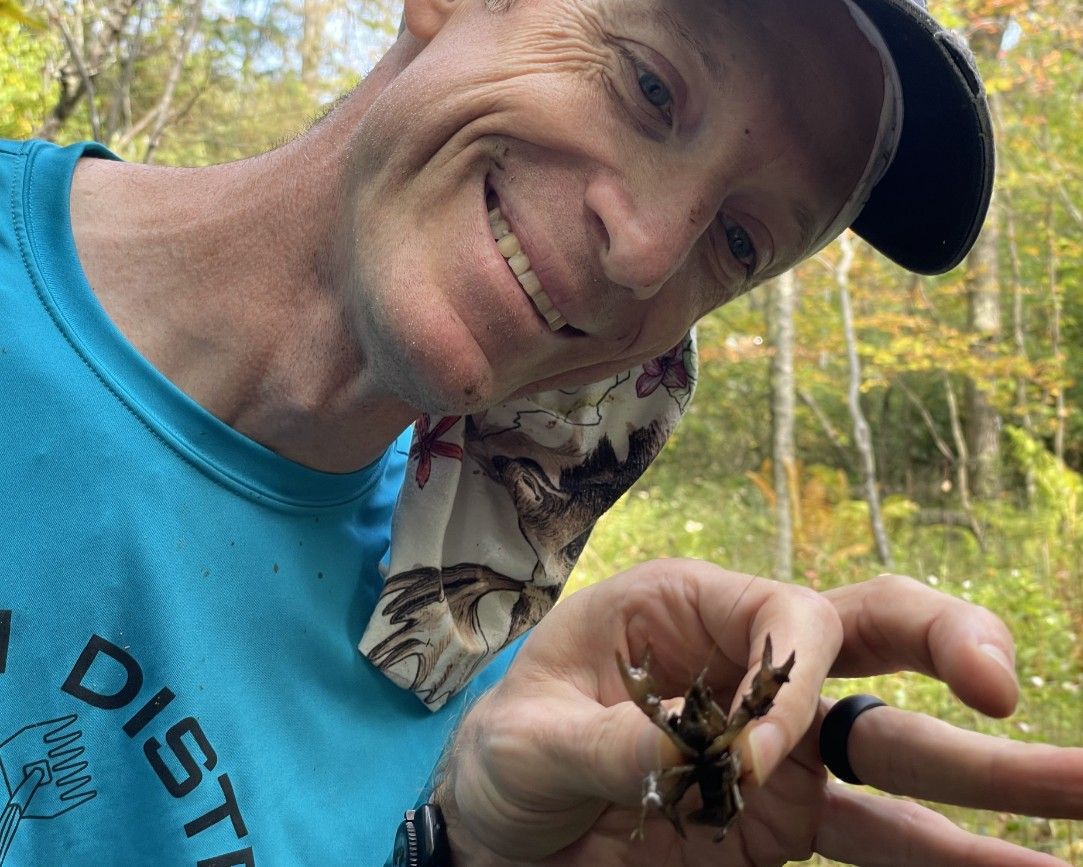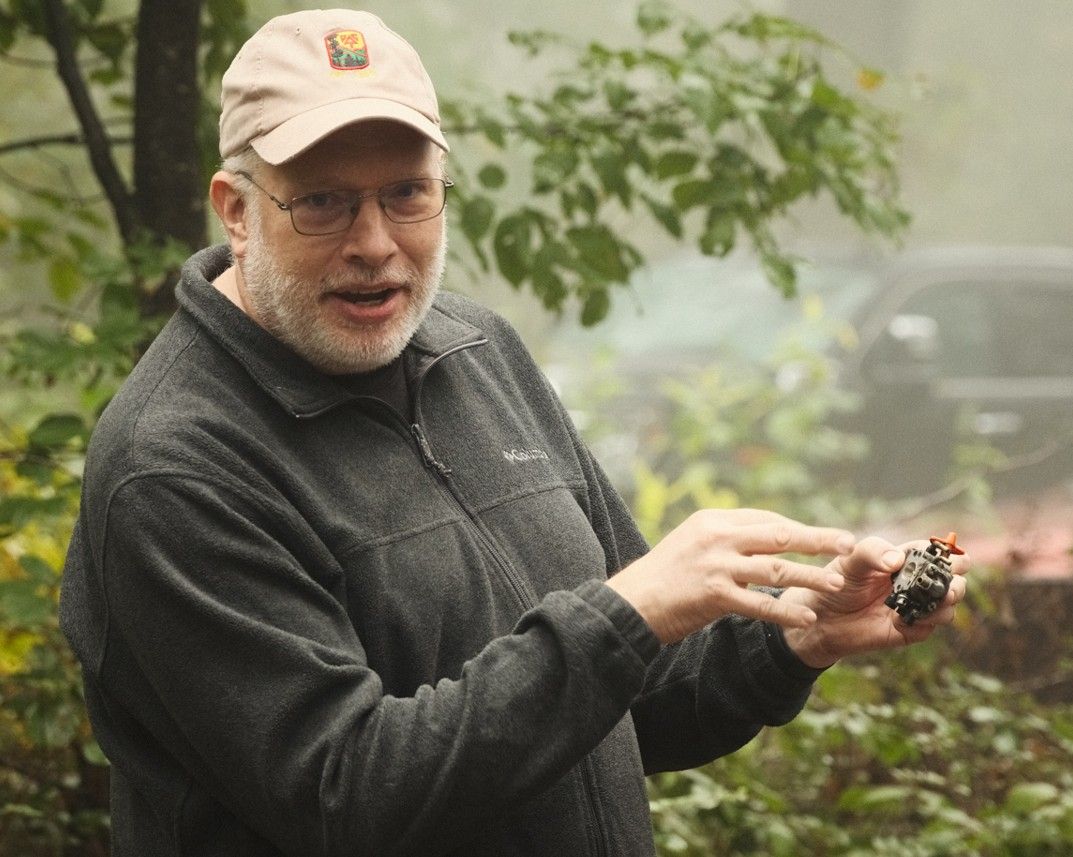SNP Hoodlums Host Successful Trail Maintainers Workshop
By Tom Moran
The Shenandoah National Park North District Hoodlums were again pleased to host their annual trail maintainers workshop on the weekend of September 20. While the workshop is open to any club member, the 30 available slots fill up fast. The 2025 workshop was the second effort by the Hoodlums to teach standards and practices to trail maintainers in the form of PATC’s Trail Maintainer Certification program. In order to earn the certification, a set of modules must be completed in the field, as well as follow-up online and first aid courses. This workshop was designed to enable attendees to complete the field requirements with hands-on practice and presented a clear roadmap for attendees to complete the remaining requirements at their own pace. The four field modules are Trail Safety, Managing Impacts on Trails, Invasive Species, and Blazing.
Attendees arriving Friday were able to check in, pitch their tents, and socialize around the campfire during and after dinner. Having a chance to meet other PATC members from varied backgrounds and experience is all part of the fun of the weekend, and is what keeps some coming back annually. Saturday morning they convened for breakfast, a safety briefing, and divided into crews for the day’s workshop activities. Before heading out, two attendees were able to experience firsthand a park service Ranger’s abilities to extract keys from locked cars. The ranger displayed great skill and effectiveness!
Jim Fetig and Dave Nebhut led a basic level crew down a section of the Elkwallow Trail, where they covered the four field modules of the course. The crew did some mud wallowing of their own, enlarging a drain field, and building a rolling grade dip in a particularly wet area of trail that had been degraded due to extreme rain in 2025. Their crew included Mike Hritz, Edgar Howell, Anthony Senerchia, Gerard Weatherby, and Chris and Michelle Viggiano.
Wayne Limberg and Michael Gergely led another basic crew over to the Traces Trail adjacent to the campground where they were able to complete the four modules. They also practiced a skill increasing in usage and popularity in SNP: making cuts on a crosscut saw, a first time handling this effective tool for nearly all. Their crew included Julie and Tim Zimmerman, Ed Elam, Daniel Sieh, Ann Beale, and Julie Biegner.
Noel Freeman and Cindy Ardecki led a more experienced crew down the Overall Run Trail to a very steep section of trail with a long staircase, in which some steps had been spaced too far from the next step. A heavily used trail due to its proximity to Overall Run Falls, the stairs endure a heavy load and occasionally need repairs. These steps really test the trail builder’s/maintainer’s abilities to ensure adherence to Sustainable, Effective, Traversable (SET principles). It required significant effort finding available rocks large enough to withstand the traffic and make solid steps meant the crew had to move rock and fill significant distances. This crew included Cecil Dallas, Robert Kilby, Marie Seymour, Steve Woofter, Cindy Ardecki, Noel Freeman and Venus Foshay.
Justin Corddry and Tom Moran led a crew of six down Overall Run/Tuscarora Trail from its start at the AT, ending at the Traces Spur trail where they finished by hiking out to the group campsite at Mathews Arm. Along the way they scraped and painted several blazes, cleaned out water bars and check dams, and replaced rotting wood in several of each. Each had the opportunity to use a swing blade to clear vegetation, and invasive weeds were identified. The session was very hands-on as many trail structures were rehabilitated. They were joined by Rose Moss, Marty Martin, Mike Durland, Zach Bedore, Erin Restel, and Colin Wagner, a George Washington University graduate student working on his thesis.
After the physical effort Saturday, Sunday would bring a more relaxed pace of learning. Following coffee and a light breakfast, the group gathered under canopies for the first of two sessions. Clouds had settled in with a fine mist, yet did not delay the program. Noel Freeman, the tools manager for the SNP North District maintainers, directly addressed a recurrent issue. Maintainers had complained of not being able to start the club’s gas-powered trimmers, which are sorely needed due to the sharp increase in vegetation over the past several years. The trimmers are a mix of two-stroke and four-stroke, which adds a layer of complexity to fuel and starting requirements. Noel walked through the differences between the two before demonstrating startup technique.
Tom Moran led the second session. It was a discussion of how and why crosscut saws have become an increasingly important tool for keeping trails clear of fallen trees. Powered tools are prohibited from being used in wilderness areas, of which large portions of SNP are defined. But while non-powered (i.e. crosscut) saws are required in these areas, they may be preferable even in areas where they are not required. The group was then led through an overview of the five steps to analyzing and executing cuts, which for bucking (as opposed to felling) is the OHLEC framework—Objective, Hazards, Leans/binds, Escape paths, and Cut plan.
The group then walked a short distance to a clearing in the woods where four blowdowns were conveniently available for illustration of how OHBEC could be applied. The attendees enjoyed the interactive session, each having the opportunity to have input into the real-life scenarios. Experienced sawyer Jim Fetig provided vital additional insight into the analyses. Each then had an opportunity to make a cut with the club crosscut saw before the session concluded. By then, it was nearly time for the concluding brunch and the group returned to the dining area, having completed the workshop.
The weekend was a great success as a number of attendees completed their field requirements for being qualified for Certified Trail Maintainer recognition. All had the chance to practice new skills, as well as develop new relationships with fellow trail maintainers. Last but not least, their work had immediate positive impact – real improvements made to real trails, well beyond having just been a classroom exercise. Plans are already in the works for the 2026 workshop. Special thanks to Dave Nebhut, who planned and organized the weekend, and to Joe Wood, who prepared three great meals for what is a very large crew, all without the help of a formal kitchen or electric power.











